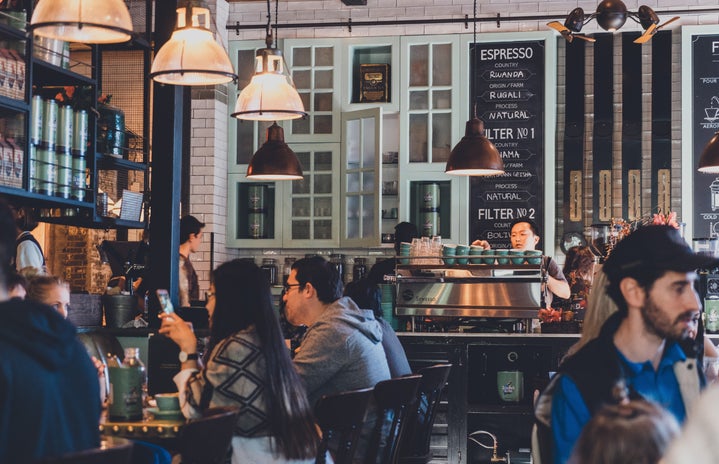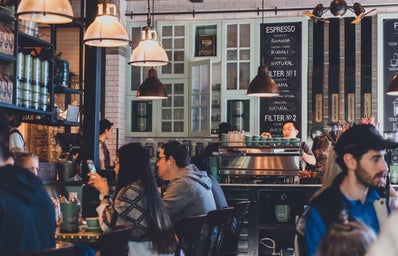Joanna Ibrahim, 33, is a Syrian refugee and the creator of a project that helps other people in the same conditions as her own. In 2015, she came to Brazil looking for peace, because Syria was at war. But why Brazil? She said that it was also possible to go to Europe, however, she would have to pass through a lot of countries before getting somewhere comfortable and safe. Here, it would be a one-way trip and the climate was hotter, something that was important to her.
As incredible as it may seem, despite owning a restaurant, she had never worked with food before. Some of her relatives were professional chefs and she had contact with this world, but never really got involved with it. Her choice was mainly based on her personal tastes. Joanna loves to eat and try new flavors. On her trip to the U.S., she fell in love with the variety of food. According to her, in Syria, they only have their type of food, so all those options opened her mind to a new perspective.
And that’s how the “Open Taste Brasil” came true. The restaurant’s concept goes beyond food service. It has a history of struggle and endurance behind it. The most important thing for them is to ensure that people have hope, opportunity, and a spark of a new life.
Her objectives are inspiring, that’s why everyone should get to know her.
- How did you come up with the idea for the project?
-
“Actually, I learned the hard way. I didn’t have a choice. When I arrived in Brazil, I lived in Paraná with a Brazilian family. The experience helped me to learn the language. While I was there, my grandmother and aunt were welcomed by a church in Juiz de Fora. I decided to go there to help them to survive altogether. When I arrived in the city, many Syrians lived there, but they didn’t speak the language. Me neither – not that much -, but I could communicate with the police and doctors, for example, so I tried to help them.
Several people had professions they might be exercising here, but the circumstances were complicated. I was in need, so I started thinking “What can I do? And what can I do for them?”. To help one of them I made some flyers and started to distribute them. He got a job and managed to afford it. As a painter, it wasn’t possible to make enough profit. We got a popcorn cart and he liked it, ended up making more money from it, and didn’t paint again. From there, I started to understand the needs of these people. They were capable, but they needed help.”
- What was the first step of the project?
-
“My grandmother – who cooks – wanted to make the typical foods of our country, that’s how she decided to work with that. When we started researching our spices and ingredients, there were some things we weren’t finding. It was very difficult, but we realized that São Paulo had everything! Then, came the idea to create a site of sellers of spices and ingredients from other cultures throughout Brazil, to facilitate the access of immigrants and refugees. Unfortunately, this project didn’t roll, both for the lack of money and the lack of staff. After a while, I met some people and we formed a team. It was easier to create this marketplace than to have a stock of our own.
I came to São Paulo only with a suitcase and a thousand reais in my account. I had nowhere to go, no bed to sleep in. I spent all my money in a week. One of my ideas to raise funds was to create a fair in a large shed of a church. We gathered people from different areas and provided handmade products, typical cuisines, people who teach languages, hairdressers, clothes, among others. We did the project, but to our surprise, people ate and left. They didn’t even bother to look at the other attractions of the fair. I was losing faith.”
- Did you have another kickstart?
-
“I saw that there was a restaurant that rented the space a day. So, I started renting once a week, called a family, did the marketing, and it was pumping. Then, we realized that people don’t even know how to calculate the fact sheet or the health safety rules, and I realized that I had to capacitate people. That’s why we stopped this project for a while.
We created a program of 7 workshops for 20 people, where they were able to understand how the kitchen works. We started to do fairs, even the big ones, one of them was Formula 1 and Lollapalooza 2021, which unfortunately were canceled because of the pandemic. It was very good, but we needed an established space.
- What about Open Taste?
-
“After that failure, we opened Open Taste, our physical space. We have a menu from different countries and we are making an online pool now to reform the space and create a better presentation. The idea is to offer cultural experiences, you can choose everything you want to on your plate with the help of the chef, there are also musical experiences…
We will become an NGO that empowers people, but not only in cooking. Many areas like how to manage a business or topics related to finance, social networks, etc., a form of specialization. The restaurant will sustain the project. After the course, people can come and apply the knowledge for three months, in a paid internship here at OpenTaste, to have it in their CV and to help them enter the labor market.”
- Did you feel any kind of discrimination?
-
“Yes, every time we post a picture or promote a publication, we have at least 10 comments telling us to go back to our countries. It’s not easy, actually, it’s discouraging, but I can’t stop. Other people need me and I need them, we are here for each other, and spreading culture is our purpose. The more people we reach, the more apprehensive they can be towards the difference; and together we can help to bring down the barriers.”
This project is about helping and touching people, therefore, it’s always emphasized that it’s possible to achieve your dreams even when it feels unthinkable.
Creating a business from scratch is not an easy task, imagine being a refugee with no money and without speaking the language of the country. Joanna proved to us that nothing is impossible through a unique and remarkable project.
For those who want to visit it, “Open Taste” is located on Eugênio de Medeiros st., 654 – Pinheiros, São Paulo, SP – Brazil.
———————————————————————
The article above was edited by Bárbara Vetos.
Liked this type of content? Check Her Campus Casper Libero’s home page for more!


